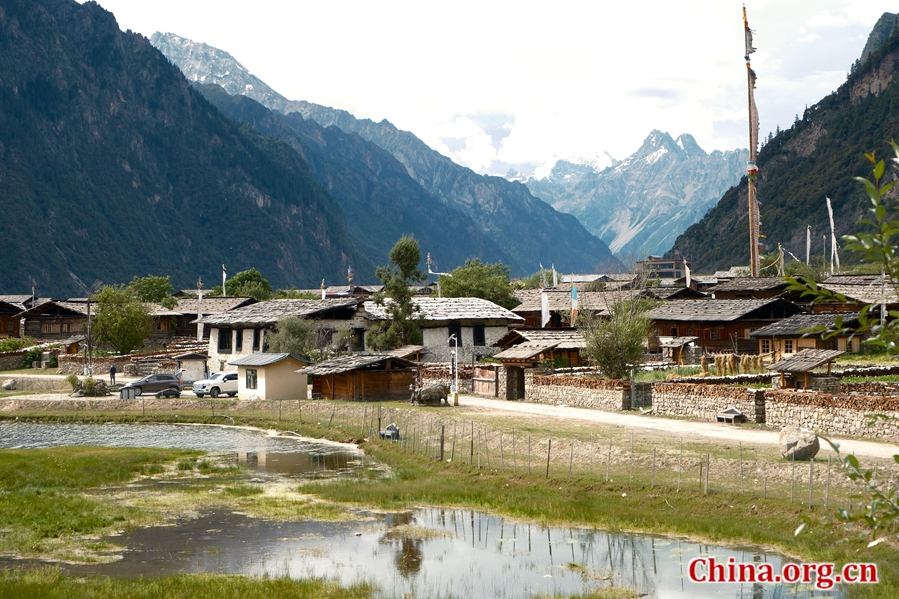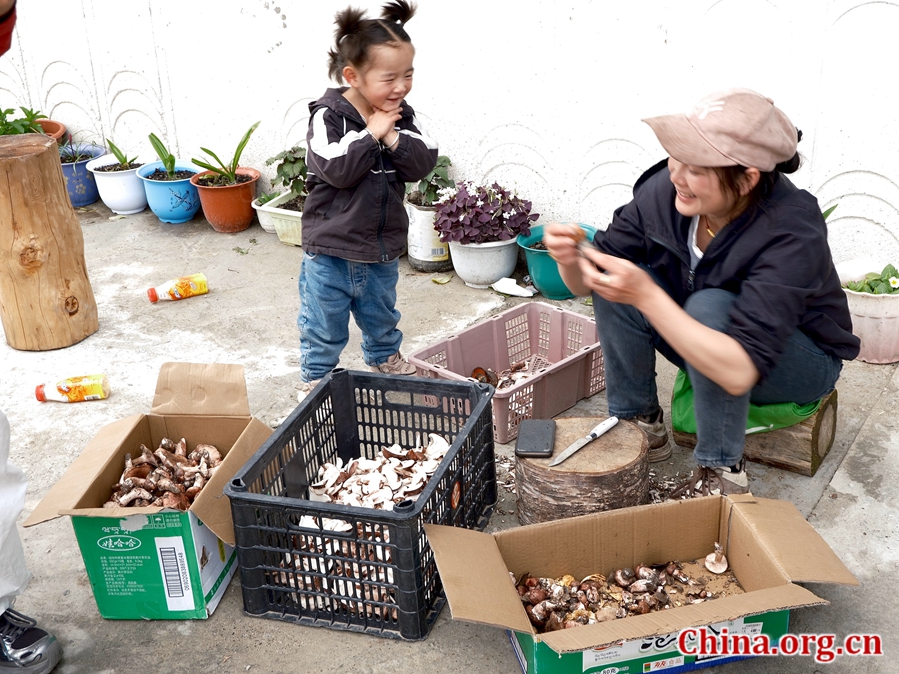Nestled beside Basum Lake, a national 5A tourist attraction, Tsogo village stands as a designated historical and cultural treasure in Gongbo Gyamda county of Nyingchi in Xizang Autonomous Region. It has undergone a remarkable transformation in recent years. Through a government-funded relocation program, tourism infrastructure development and innovative livestock farming, this once-impoverished community has become a shining example of China's rural revitalization strategy.
The soon-to-be-completed renovation of Tsogo village, Gongbo Gyamda county, Nyingchi, Xizang Autonomous Region, July 26, 2025. [Photo by Liao Jiaxin/China.org.cn]
New homes, new opportunities
A 92-million-yuan relocation project launched in 2018 has transformed living conditions in Tsogo village. Residents exchanged their centuries-old homes — some dating back 460 years — for modern housing in a nearby resettlement community, gaining paved roads, reliable electricity and running water for the first time.
"Our family of five used to live in just 60 square meters," said villager Lhakpa Tundrup. "Now my sister lives in the 180-square-meter relocation home, while I built a nearly 400-square-meter house nearby." He described the change as having dramatically improved his family's living conditions.
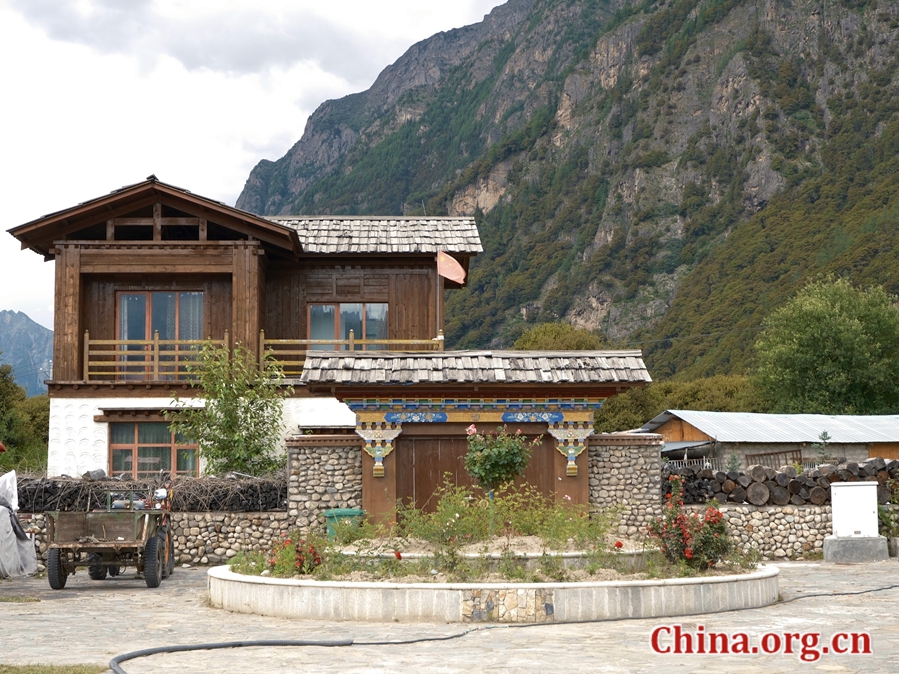
One of the newly built resettlement houses in Tsogo village, Gongbo Gyamda county, Nyingchi, Xizang Autonomous Region, July 26, 2025. [Photo by Liao Jiaxin/China.org.cn]
While the resettlement offers modern comforts, the original village is undergoing a 44-million-yuan restoration, set for completion by the year's end, according to Yu Sen, deputy director of Gongbo Gyamda County Culture and Tourism Bureau. Yu noted that while the ancient village remains closed to visitors, its preservation has boosted economic activity in the adjacent resettlement area.
The most significant economic improvement occurred in 2022 when a tourism company converted unused spaces in the village into 137 boutique hotel rooms. According to Yu, the project generated over 5 million yuan in rental income for villagers during its first three years of operation.
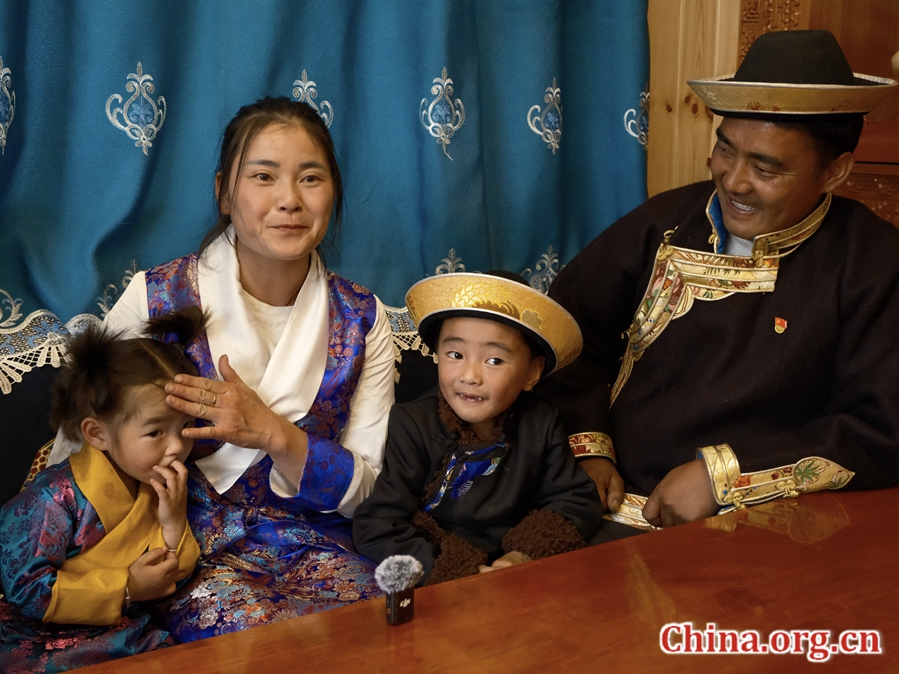
Lhakpa Tundrup, his wife Liang Qinglan and their children at home in Tsogo village, Gongbo Gyamda county, Nyingchi, Xizang Autonomous Region, July 26, 2025. [Photo by Liao Jiaxin/China.org.cn]
The earnings have been "extraordinary for a village," Yu explained, adding that the extra income has significantly improved residents' quality of life.
A couple's journey: From pig farm to prosperity
The success of Lhakpa Tundrup's pig farming business became another marker of Tsogo's transformation, alongside the housing improvements.
After military service in Guangdong province, he returned home with his wife Liang Qinglan, a Zhuang ethnic woman from Guangxi who had been working in Guangzhou's garment industry. The couple married after settling in the village, where Liang adapted to rural Tibetan life, and then together they built a thriving business raising Tibetan pigs.
Starting out working in the village pig cooperative, the couple handled daily tasks from feeding to disease prevention, with Liang earning an additional 10,000 yuan annually by selling pig manure as fertilizer.
Liang Qinglan sorts freshly picked mushrooms in front of her home in Tsogo village, Gongbo Gyamda county, Nyingchi, Xizang Autonomous Region, July 26, 2025. [Photo by Liao Jiaxin/China.org.cn]
Their operation now maintains 370 Tibetan pigs, supplying local hotels and offering roasted pork services. Recognized as a specialist in Tibetan pig farming in 2021, Lhakpa Tundrup began receiving quarterly government feed subsidies. In 2022, he distributed 100 piglets to neighbors to help boost local incomes through pig breeding. That year also marked his first major commercial success with the sale of 50 mature pigs.
The couple's business has evolved from traditional farming to integrated operations combining livestock production with tourism services, strategically blending heritage practices with modern opportunities.
A blueprint for rural revival
Tsogo's success lies in balancing heritage preservation with modern development. As the ancient village's restoration nears completion, its residents have already shown how traditional livelihoods can evolve — through tourism, entrepreneurship and community cooperation.
With improved housing, steady incomes and cultural pride, Tsogo stands as a testament to China's rural revitalization efforts, proving that even remote villages can thrive in the modern era.
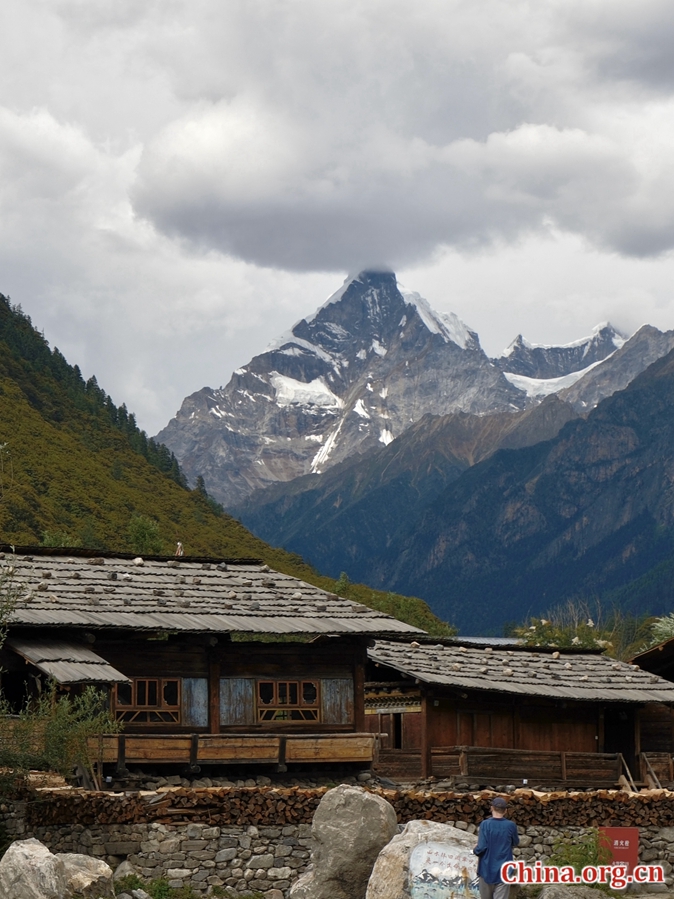
Traditional houses with snow-capped mountains in the background, Tsogo village, Gongbo Gyamda county, Nyingchi, Xizang Autonomous Region, July 26, 2025. [Photo by Liao Jiaxin/China.org.cn]
